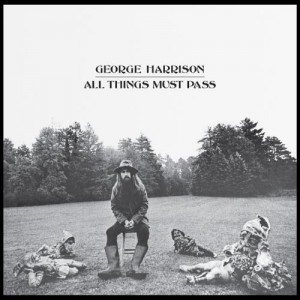
All Things Must Pass is the third studio album by the English rock musician George Harrison. Released as a triple album in November 1970, it was Harrison's first solo work after the break-up of the Beatles in April that year. It includes the hit singles "My Sweet Lord" and "What Is Life", as well as songs such as "Isn't It a Pity" and the title track that had been overlooked for inclusion on releases by the Beatles. The album reflects the influence of Harrison's musical activities with artists such as Bob Dylan, the Band, Delaney & Bonnie and Friends and Billy Preston during 1968–70, and his growth as an artist beyond his supporting role to former bandmates John Lennon and Paul McCartney. All Things Must Pass introduced Harrison's signature slide guitar sound and the spiritual themes present throughout his subsequent solo work. The original vinyl release consisted of two LPs of songs and a third disc of informal jams titled Apple Jam. Several commentators interpret Barry Feinstein's album cover photo, showing Harrison surrounded by four garden gnomes, as a statement on his independence from the Beatles.
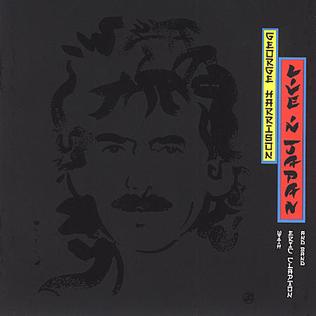
Live in Japan is a live double album by the English musician George Harrison, released in July 1992. Credited to "George Harrison with Eric Clapton and Band", it was Harrison's second official live album release, after 1971's Grammy-winning The Concert for Bangladesh. The album was recorded during his Japanese tour backed by Eric Clapton in December 1991, and it contains live versions of Harrison's work as a solo artist alongside many of his best-known Beatles songs. Aside from the 2001 reissue of All Things Must Pass, with previously unavailable bonus tracks, Live in Japan was Harrison's last release before his death in November 2001.

Cloud Nine is the eleventh studio album by the English rock musician George Harrison. The album was recorded and released in 1987 after Harrison had taken a five-year hiatus from his career as a solo artist. The hit single "Got My Mind Set on You" from this album re-established Harrison as a critically acclaimed and commercially significant recording artist. Cloud Nine was Harrison's final solo studio album to be released during his lifetime; his next album Brainwashed was released in 2002, almost a year after his death.

Thirty Three & 1⁄3 is the seventh studio album by the English musician George Harrison, released in November 1976. It was Harrison's first album release on his Dark Horse record label, the worldwide distribution for which changed from A&M Records to Warner Bros. as a result of his late delivery of the album's master tapes. Among other misfortunes affecting its creation, Harrison suffered hepatitis midway through recording, and the copyright infringement suit regarding his 1970–71 hit song "My Sweet Lord" was decided in favour of the plaintiff, Bright Tunes Music. The album contains the US top 30 singles "This Song" – Harrison's satire on that lawsuit and the notion of plagiarism in pop music – and "Crackerbox Palace". Despite the problems associated with the album, many music critics recognised Thirty Three & 1⁄3 as a return to form for Harrison after his poorly received work during 1974–75, and considered it his strongest collection of songs since 1970's acclaimed All Things Must Pass.
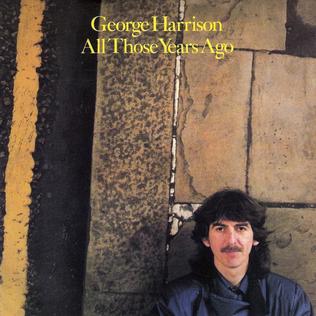
"All Those Years Ago" is a song by the English rock musician George Harrison, released in May 1981 as a single from his ninth studio album Somewhere in England. Having previously recorded the music for the song, Harrison tailored the lyrics to serve as a personal tribute to his former Beatles bandmate John Lennon, following the latter's murder in 1980. Ringo Starr is featured on drums, and Paul McCartney overdubbed backing vocals onto the basic track. The single spent three weeks at number 2 on the US Billboard Hot 100, behind "Bette Davis Eyes" by Kim Carnes, and it peaked at number 13 on the UK Singles Chart. It also topped Canada's RPM singles chart and spent one week at number 1 on Billboard's Adult Contemporary listings.
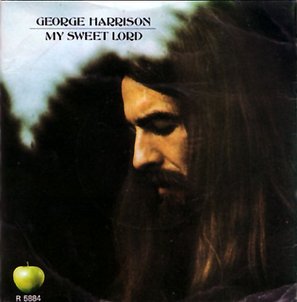
"My Sweet Lord" is a song by English musician George Harrison, released in November 1970 on his triple album All Things Must Pass. It was also released as a single, Harrison's first as a solo artist, and topped charts worldwide; it was the biggest-selling single of 1971 in the UK. In America and Britain, the song was the first number-one single by an ex-Beatle. Harrison originally gave the song to his fellow Apple Records artist Billy Preston to record; this version, which Harrison co-produced, appeared on Preston's Encouraging Words album in September 1970.
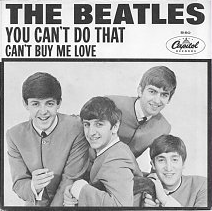
"You Can't Do That" is a song written by John Lennon and released by the English rock band the Beatles as the B-side of their sixth British single "Can't Buy Me Love". It was later released on their third UK album A Hard Day's Night (1964). A live rendition of the song was released on the 2016 re-release of The Beatles at the Hollywood Bowl.
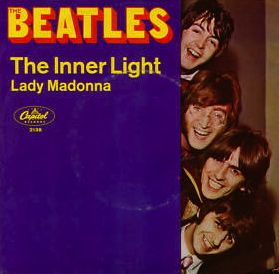
"The Inner Light" is a song by the English rock band the Beatles, written by George Harrison. It was released on a non-album single in March 1968, as the B-side to "Lady Madonna". The song was the first Harrison composition to be issued on a Beatles single and reflects the band's embrace of Transcendental Meditation, which they were studying in India under Maharishi Mahesh Yogi at the time of the single's release. After "Love You To" and "Within You Without You", it was the last of Harrison's three songs from the Beatles era that demonstrate an overt Indian classical influence and are styled as Indian pieces. The lyrics are a rendering of chapter 47 from the Taoist Tao Te Ching, which he set to music on the recommendation of Juan Mascaró, a Sanskrit scholar who had translated the passage in his 1958 book Lamps of Fire.

"This Song" is a song by English rock musician George Harrison from his 1976 album Thirty Three & 1/3. It was released as the first single from the album and reached number 25 on the American pop charts but failed to chart in the UK. Harrison wrote the song as a response to the copyright infringement suit launched against him over his early 1970s hit "My Sweet Lord". The lyrics use terminology associated with the court case and mention other song titles as a satirical comment on the notion of plagiarism in popular music.
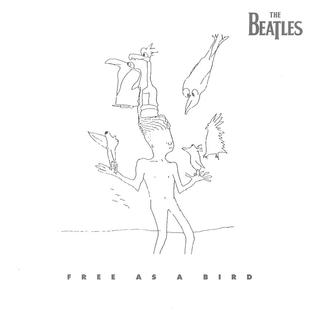
"Free as a Bird" is a single released in December 1995 by English rock band the Beatles. The song was originally written and recorded in 1977 as a home demo by John Lennon. In 1995, 25 years after their break-up and 15 years after Lennon's murder, his then surviving bandmates Paul McCartney, George Harrison and Ringo Starr released a studio version incorporating the demo.

"What Is Life" is a song by the English rock musician George Harrison from his 1970 triple album All Things Must Pass. In many countries, it was issued as the second single from the album, in February 1971, becoming a top-ten hit in the United States, Canada and elsewhere, and topping singles charts in Australia and Switzerland. In the United Kingdom, "What Is Life" appeared as the B-side to "My Sweet Lord", which was the best-selling single there of 1971. Harrison's backing musicians on the song include Eric Clapton and the entire Delaney & Bonnie and Friends band, with whom he had toured during the final months of the Beatles. Harrison co-produced the recording with Phil Spector, whose Wall of Sound production also employed a prominent string arrangement by John Barham and multiple acoustic rhythm guitars, played by Harrison's fellow Apple Records signings Badfinger.
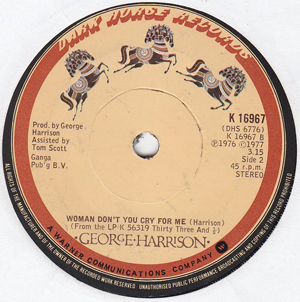
"Woman Don't You Cry For Me" is a song by English musician George Harrison, released as the opening track of his 1976 album Thirty Three & 1/3.

"Dark Horse" is a song by English rock musician George Harrison and the title track to his 1974 solo album on Apple Records. The song was the album's lead single in North America, becoming a top-20 hit in the United States, but it was Harrison's first single not to chart in Britain when issued there in February 1975. The term "dark horse" had long been applied to Harrison due to his unexpected emergence as the most accomplished solo artist of the four former Beatles following the band's break-up in 1970. In the song, however, he said he used the phrase in reference to gossip about someone who carries out clandestine sexual relationships. Commentators interpret the lyrics as a rebuttal to several possible detractors: Harrison's first wife, Pattie Boyd; reviewers who criticised the spiritual content of his 1973 album Living in the Material World; and his former bandmates John Lennon and Paul McCartney. Harrison named his Dark Horse record label after the song, and his 1974 North American tour with Ravi Shankar came to be known as the Dark Horse Tour.
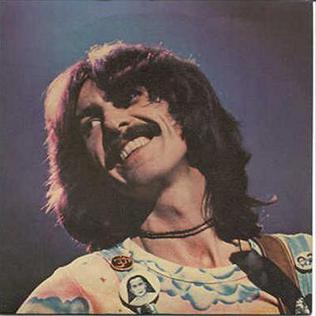
"You" is a song by English musician George Harrison, released as the opening track of his 1975 album Extra Texture . It was also the album's lead single, becoming a top 20 hit in America and reaching number 9 in Canada. A 45-second instrumental portion of the song, titled "A Bit More of You", appears on Extra Texture also, opening side two of the original LP format. Harrison wrote "You" in 1970 as a song for Ronnie Spector, formerly of the Ronettes, and wife of Harrison's All Things Must Pass co-producer Phil Spector. The composition reflects Harrison's admiration for 1960s American soul/R&B, particularly Motown.
"Behind That Locked Door" is a song by English rock musician George Harrison from his 1970 triple album All Things Must Pass. Harrison wrote the song in August 1969 as a message of encouragement to Bob Dylan, who was making a highly publicised comeback to the concert stage, accompanied by the Band, with a headlining performance at the Isle of Wight Festival. "Behind That Locked Door" is a rare Harrison composition in the country music genre and the second song dealing with the friendship between himself and Dylan, after their 1968 collaboration "I'd Have You Anytime". Its lyrics address Dylan's elusive nature, and reflect the high regard in which Harrison held the American singer's work. The same reluctance on Dylan's part to re-engage with a concert audience led to him retreating again from live performance until August 1971, when he responded to Harrison's request to play at the Concert for Bangladesh.
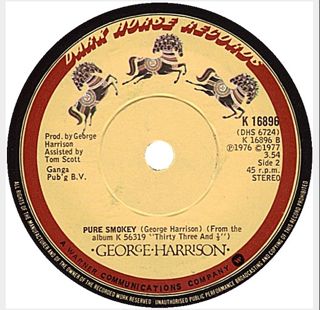
"Pure Smokey" is a song by English musician George Harrison, released in 1976 on his debut album for Dark Horse Records, Thirty Three & 1/3. The song was the second of Harrison's musical tributes to American soul singer Smokey Robinson, following "Ooh Baby " in 1975. Harrison frequently cited Robinson as one of his favourite vocalists and songwriters, and Robinson's group the Miracles had similarly influenced the Beatles during the 1960s. In the lyrics to "Pure Smokey", Harrison gives thanks for the gift of Robinson's music, while making a statement regarding the importance of expressing appreciation and gratitude, rather than forgetting to do so and later regretting it. The song title came from the name of Robinson's 1974 album Pure Smokey.

"Learning How to Love You" is a song by English musician George Harrison, released in 1976 as the closing track of his debut album on his Dark Horse record label, Thirty Three & 1/3. Harrison wrote the song for Herb Alpert, sometime singer and co-head of A&M Records, which at the time was the worldwide distributor for Dark Horse. Although the relationship with A&M soured due to Harrison's failure to deliver Thirty Three & 1/3 on schedule, resulting in litigation and a new distribution deal with Warner Bros. Records, Harrison still dedicated the song to Alpert in the album's liner notes.

"Apple Scruffs" is a song by English rock musician George Harrison from his 1970 triple album All Things Must Pass. He wrote it as a tribute to the die-hard Beatles fans known as Apple scruffs, who used to wait outside the Apple Corps building and other London locations for a glimpse of the band members. This tradition continued after the group's break-up in April 1970, as the scruffs were a regular presence outside the studios where Harrison recorded his album. The song was also issued on the album's second single, as the B-side to "What Is Life".

Joi Bangla is an EP by Indian sitar virtuoso Ravi Shankar, issued in August 1971 on Apple Records. The recording was produced by George Harrison and its release marked the first in a series of occasional collaborations between the two musicians that lasted until the Chants of India album in 1997. Shankar recorded the EP in Los Angeles, to help raise international awareness of the plight faced by refugees of the Bangladesh Liberation War, in advance of his and Harrison's Concert for Bangladesh shows at Madison Square Garden, New York. Side one of the disc consists of two vocal compositions sung in Bengali, of which the title track was a message of unity to the newly independent nation, formerly known as East Pakistan. The third selection is a duet by Shankar and sarodya Ali Akbar Khan, supported by Alla Rakha on tabla, a performance that presaged their opening set at the Concert for Bangladesh.

Songs by George Harrison is a book of song lyrics and commentary by English musician George Harrison, with illustrations by New Zealand artist Keith West. It was published in February 1988, in a limited run of 2500 copies, by Genesis Publications, and included an EP of rare or previously unreleased Harrison recordings. Intended as a luxury item, each copy was hand-bound and boxed, and available only by direct order through Genesis in England. The book contains the lyrics to 60 Harrison compositions, the themes of which West represents visually with watercolour paintings. Starting in 1985, Harrison and West worked on the project for two years, during which Harrison returned to music-making with his album Cloud Nine, after focusing on film production for much of the early 1980s. The book includes a foreword by his Cloud Nine co-producer, Jeff Lynne, and a written contribution from Elton John.


















